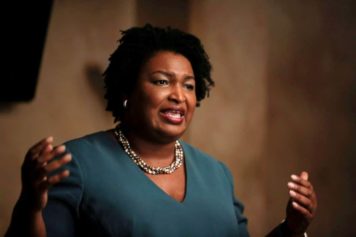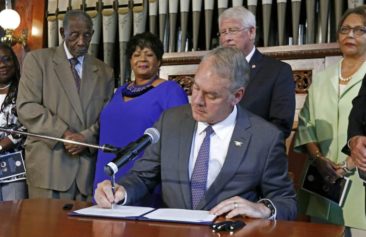The fourth Sunday of Advent service at St. Martin’s Episcopal Church in Chicago was marked by a special brunch. The meal included decadent soul food entrees like ham, dressing and collard greens, along with dishes such as mashed potatoes and gravy, spaghetti and chicken. Several types of cookies and peach cobbler were served for dessert. Church members could also choose tea, soda, coffee or water to drink.
The meal was a time for members to spend more time with one another, engage in conversation and share a laugh or two. Most of the people who attended the brunch also went back for seconds. The brunch lasted for hours before the members, which included Hispanics, Asians and whites, washed the plates and serving dishes, cleaned the kitchen and stored the leftovers for Christmas Eve service.
The pastor of St. Martin, Father Christopher Griffin, participated in the brunch festivities as well. He held a plate filled with food with one hand, making his large stomach, which was hanging over his belt buckle, even more visible. Father Griffin was asked by a reporter if he was concerned about his weight. He answered that, like “every American,” he’d “like to lose weight.”
In addition to the special meals often held at the church, there’s a coffee hour most Sundays, and large amounts of food are served during this time as well.
Church Members and Obesity
The rich, high-calorie dinners that are often served after church service are sometimes cited as the reason that many Blacks are chronically obese. These dinners also serve as a source of fellowship and social connection for African-Americans and provide a sense of comfort that many Black people don’t have the privilege of experiencing during the week — especially given the rising racial tension in many parts of the country.
African-American women and men who eat comfort foods that are high in fat, like pound cake, macaroni and cheese, or high-fat meat dishes, have higher obesity rates than most other ethnic groups in the U.S. However, Black people usually gain weight for different reasons than obese individuals of other ethnicities. Most African-Americans who are overweight suffer from conditions like high blood pressure, heart disease or diabetes. Compared to other racial groups, these conditions can significantly shorten the life spans of African-Americans.
Eating As a Coping Mechanism
African-Americans often eat foods that are high in fat as a way to lower their stress levels. The stress and tension many Black people feel comes from living in environments where the crime rate is high and housing is inadequate, according to James S. Jackson, Ph.D., from the Institute for Social Research at the University of Michigan. Jackson explained that wealthy or middle-class Blacks still suffer from daily micro-aggressions, including racial insults that are both subtle and blatant.
For instance, women often pull their purses close to them when a Black man walks by. Armed security guards are more likely to follow Black male shoppers around at a retail establishment, assuming that they will steal the merchandise.
In addition to eating as a way to deal with stress, some Black people may exhibit behaviors such as drinking, smoking and using illegal drugs. Jackson and co-authors Katherine M. Knight, Ph.D., and Jane A. Rafferty, Ph.D., wrote that this may help reduce the risk of mental illness in some racial groups. However, when Black people engage in these behaviors while still trying to manage chronic stress, Jackson, Knight and Rafferty state that this can lead to “large physical disparities that are unfavorable to blacks.”
Obesity Rates Among African-Americans Is Shocking
While church dinners may contribute significantly to the weight problem in the African-American community, stress eating — any day of the week — plays a huge role as well. Almost 40% of all Black men and 60% of all Black women are considered obese, according to 2012 data from the U.S. Centers for Disease Control and Prevention. The data was derived from individuals over the age of 20.
Obesity is a medical term for excess body fat as it relates to a person’s height and weight. Jackson emphasizes that obesity is a “very complicated issue” and that “gender and cultural” issues” indeed play a part in a person’s weight.
Young girls learn their eating behaviors from their mothers, who often eat and prepare huge meals on Sundays after church. Some women eat big dinners on a daily basis, which sends the message to girls that being overweight is not a problem.
Black men also encourage Black women to be overweight. As Jackson points out “being skinny isn’t valued.” Women get the impression that having extra weight on their bodies makes them attractive to men, and this lowers their motivation to get rid of excess body fat.
Church Dinners Are Still Important
The church dinner often gives African-Americans time to to feel loved and accepted, and provides a space to “recharge” and prepare for a week that may be filled with injustices and discrimination.
There are still places in the U.S. where Black people are not welcomed to dine, which is all the more reason for churches to prepare delicious food and a safe place for members.
The church dinner is a tradition that dates back to slavery, and its goal is to make everyone feel embraced and accepted.
Father Griffin says, “Sunday was the only day Blacks were free. At church, Black people were somebody. They held positions in the church, such as deacon. They were honored and welcomed. They then sat down to eat and enjoy their day.”
It’s clear that the church dinner is about more than just food, although some members would likely be disappointed if certain traditional dishes were removed from the menu. However, it may be beneficial for churches to serve healthier dishes by reducing animal fat, cutting out processed ingredients and decreasing sugar and portion sizes. This will maintain the cultural importance of the church dinner, while helping members to maintain or establish good physical health.


